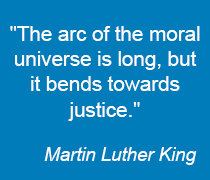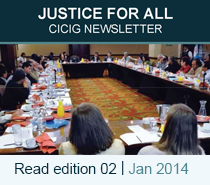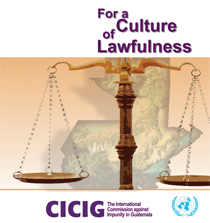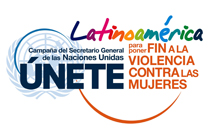PRESS RELEASE 038
ROSENBERG CASE: VALDÉS PAIZ BROTHERS COULD STAND TRIAL
 Guatemala, August 1, 2013. If no appeal is filed by the defense counsel, a pre-trial hearing to open oral arguments will be held tomorrow where Judge Óscar Sagastume of the Third Court of the First Criminal Instance will decide whether the brothers José Estuardo Valdés Paiz and Francisco José Ramón Valdés Paiz should stand trial for their alleged involved in the murder of the lawyer Rodrigo Rosenberg Marzano on May 10, 2009.
Guatemala, August 1, 2013. If no appeal is filed by the defense counsel, a pre-trial hearing to open oral arguments will be held tomorrow where Judge Óscar Sagastume of the Third Court of the First Criminal Instance will decide whether the brothers José Estuardo Valdés Paiz and Francisco José Ramón Valdés Paiz should stand trial for their alleged involved in the murder of the lawyer Rodrigo Rosenberg Marzano on May 10, 2009.
The Valdés Paiz brothers are charged with complicity in murder. Furthermore, the situation of Diego Moreno Botrán will be ruled on at the hearing. Botrán is accused of collusion (an agreement reached between individuals to cause harm to third parties). The situation of Nicolaid Rodolfo Ibarra Figueredo will also be addressed. Figueredo is charged with obstruction of justice, collusion, and conspiracy to commit collusion.
The Public Prosecutor’s Office (MP) and the International Commission against Impunity in Guatemala (CICIG) will file 122 pieces of evidence (testimonies, documents, material evidence and scientific evidence), including: ballistics reports, communication analyses, video camera recordings, and early statements—all of which link the charged individuals to the facts. The MP and CICIG deem there to be sufficient evidence against these individuals in order to send them to trial.
Background
On May 10, 2009, the attorney Rodrigo Rosenberg Marzano was murdered in Zone 14 of Guatemala City. Before being murdered, the attorney recorded a video in which he blamed then high-ranking government officials for his death. The investigation produced a different result to the suggestions made by the attorney.
On July 15, 2010, the Court of Criminal Sentencing sentenced nine individuals (perpetrators) to between 8 and 48 years in prison. The decision was upheld by the Supreme Court of Justice on March 31, 2011.
The Commission reiterates its commitment to justice
CICIG reiterates that at no point has it influenced the suspension of proceedings, because such decisions are to be exclusively made by judges. In accordance with the opinion of April 12, 2013 of the Human Rights Ombudsman, CICIG recalls that the Ombudsman stated that the ordinary, constitutional courts were responsible for violating due process and the right of the brothers José Estuardo Valdés Paiz and Francisco José Ramón Valdés Paiz to be tried within a reasonable term.
The Ombudsman also recommended avoiding the unnecessary overuse of amparo appeals, among others, to hinder the progress of criminal proceedings.
In the opinion, the Ombudsman stated that parties to the proceedings used various appeals, including 14 amparo appeals: 11 were filed by the accused (without distinction), 2 by CICIG and 1 by another accused individual.
CICIG participates in these criminal proceedings as a complementary prosecutor


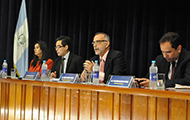
 Guatemala, August 1, 2013. If no appeal is filed by the defense counsel, a pre-trial hearing to open oral arguments will be held tomorrow where Judge Óscar Sagastume of the Third Court of the First Criminal Instance will decide whether the brothers José Estuardo Valdés Paiz and Francisco José Ramón Valdés Paiz should stand trial for their alleged involved in the murder of the lawyer Rodrigo Rosenberg Marzano on May 10, 2009.
Guatemala, August 1, 2013. If no appeal is filed by the defense counsel, a pre-trial hearing to open oral arguments will be held tomorrow where Judge Óscar Sagastume of the Third Court of the First Criminal Instance will decide whether the brothers José Estuardo Valdés Paiz and Francisco José Ramón Valdés Paiz should stand trial for their alleged involved in the murder of the lawyer Rodrigo Rosenberg Marzano on May 10, 2009.